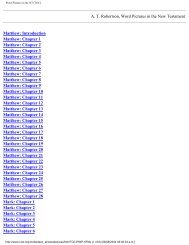Commentary on Joshua - Keil & Delitzsch - David Cox
Commentary on Joshua - Keil & Delitzsch - David Cox
Commentary on Joshua - Keil & Delitzsch - David Cox
Create successful ePaper yourself
Turn your PDF publications into a flip-book with our unique Google optimized e-Paper software.
<strong>Keil</strong> and <strong>Delitzsch</strong> <str<strong>on</strong>g>Commentary</str<strong>on</strong>g> <strong>on</strong> the Old Testament<br />
<br />
they were to commence with the blessings, is incorrect. But if, <strong>on</strong> the other hand, we<br />
c<strong>on</strong>nect the word "before" with the principal verb of the sentence, "commanded," the<br />
meaning will be that Moses did not give the command to proclaim the blessings and<br />
cursings to the people for the first time in c<strong>on</strong>necti<strong>on</strong> with these instructi<strong>on</strong>s (Deut<br />
27), but had d<strong>on</strong>e so before, at the very outset, namely, as early as Deut 11:29.<br />
Verse 34-35. "And afterwards (after the people had taken the place assigned them)<br />
he read to them all the words of the law," i.e., he had the law proclaimed aloud by the<br />
pers<strong>on</strong>s entrusted with the proclamati<strong>on</strong> of the law, viz., the Levitical priests. qaaraa'<br />
(OT:7121), lit. to call out of proclaim, then in a derivative sense to read, inasmuch as<br />
reading aloud is proclaiming (as, for example, in Ex 24:7). The words "the blessing<br />
and the curse" are in appositi<strong>on</strong> to "all the words of the law," which they serve to<br />
define, and are not to be understood as relating to the blessings in Deut 28:1-14, and<br />
the curses in Deut 27:15-26 and 28:15-68. The whole law is called "the blessing and<br />
the curse" with special reference to its c<strong>on</strong>tents, inasmuch as the fulfilment of it<br />
brings eo ipso a blessing, and the transgressi<strong>on</strong> of it eo ipso a curse. In the same<br />
manner, in Deut 11:26, Moses describes the expositi<strong>on</strong> of the whole law in the<br />
steppes of Moab as setting before them blessing and cursing. In v. 35 it is most<br />
distinctly stated that <strong>Joshua</strong> had the whole law read to the people; whilst the<br />
expressi<strong>on</strong> "all Israel," in v. 33, is more fully explained as signifying not merely the<br />
c<strong>on</strong>gregati<strong>on</strong> in its representatives, or even the men of the nati<strong>on</strong>, but "all the<br />
c<strong>on</strong>gregati<strong>on</strong> of Israel, with the women, and the little <strong>on</strong>es, and the strangers that<br />
were in the midst of it."<br />
Nothing is said about the march of <strong>Joshua</strong> and all Israel to Gerizim and Ebal. All that<br />
we know is, that he not <strong>on</strong>ly took with him the people of war and the elders or heads<br />
of tribes, but all the people. It follows from this, however, that the whole of the<br />
people must have left and completely vacated the camp at Gilgal in the valley of the<br />
Jordan. For if all Israel went to the mountains of Gerizim and Ebal, which were<br />
situated in the midst of the land, taking even the women and children with them, it is<br />
not likely that they left their cattle and other possessi<strong>on</strong>s behind them in Gilgal,<br />
exposed to the danger of being plundered in the meantime by the Canaanites of the<br />
http://207.44.232.113/~bible/comment/ot/k&d/josh/jos46.html (1 of 3) [13/08/2004 01:17:34 p.m.]
















